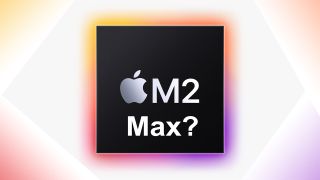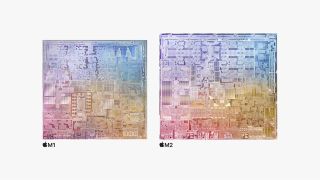Alleged Apple M2 Max CPU Benchmarks Leak
Could this be the heart of a new MacBook Pro?

Benchmarks for Apple’s unannounced but almost certainly real M2 Max have appeared in Geekbench results, which shows a 12-core processor running at 3.54GHz and backed by 96GB of RAM. The rumored chip, which would be used in forthcoming MacBook Pro and Mac Studio models, offers a slight increase in performance over the existing M1 Max if the Geekbench run is accurate.

The Geekbench 5 results are for a 'Mac14,6' computer running on unreleased macOS 13.2 software. It manages a single-core score of 1,853 and a multi-core score of 13,855. If accurate, this is a little disappointing, as an eight-core M2 MacBook Pro hits 1,899 in the same single-core benchmark. However, the greater number of cores in the M2 Max machine sees it pull ahead in the multi-core ranking, with the M1 scoring 8,737 (5,000 points behind). However, all the M-class Macs trounce an Intel iMac from 2020, with that machine's Core i7-10700K at 3.8GHz scoring 1,250 in the single-core test and 8,157 in the multi-core.
A report from Taiwan's DigiTimes claims Apple will move from the M2's current 5nm TMSC process to a 3nm node for the M2 Pro. Of course, Apple hasn't announced this development, but manufacturing capacity at TSMC was reportedly booked by Apple back in the summer.
The previous generation M1 chips were eventually available in four guises: vanilla, Pro, Max and Ultra, with the upper-level chips having more cores and beefier GPUs. While the Mac mini, iMac, MacBook Air, a few MacBook Pros and the iPad Pro got basic chips, most MacBook Pros come with a choice of M1 Pro or M1 Max, with the new Mac Studio able to be specced with an M1 Ultra, which is two M1 Pro chips stuck together. While the M1 has eight or 10 CPU cores, the differences between the chips are mainly expressed in the number of GPU cores and the amount of RAM in the package.
It's not unreasonable to expect M2 to go the same route, and while so far we've only seen M2 in the 2022 MacBook Air and a single MacBook Pro model (as well as an iPad Pro), we expect the processor to make its way through the entire Mac computer range, even perhaps infiltrating the Mac Pro, which is still an Intel-only zone.
Stay on the Cutting Edge
Join the experts who read Tom's Hardware for the inside track on enthusiast PC tech news — and have for over 25 years. We'll send breaking news and in-depth reviews of CPUs, GPUs, AI, maker hardware and more straight to your inbox.

Ian Evenden is a UK-based news writer for Tom’s Hardware US. He’ll write about anything, but stories about Raspberry Pi and DIY robots seem to find their way to him.
-
hotaru251 M1 was great as a chip.Reply
M2? not as much exciting.
seems it doesnt really scale well (as most ppl wont notice between M1 and M2) which is concerning. -
SSGBryan So, roughly the speed of a Ryzen 7 7700x.Reply
I definitely made the right decision to dump Apple for AMD. -
M0rtis It seems like the initial boost and hype of the M1 chips was due to the switch from X86/64 processors to an Arm based architecture and the software optimization for this. With the M2 series we can see that future improvements are going to be par for the courseReply
Most Popular


